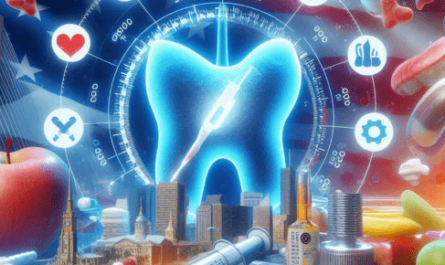Stress is something we all experience at some point in our lives, whether it’s due to work, relationships, or unexpected challenges. While most of us are aware of stress’s impact on mental and physical health, its effects on oral health often go unnoticed. Stress can take a toll on your teeth, gums, and overall oral hygiene in surprising ways. By understanding these effects and taking proactive measures with the help of a dentist from a dental office in Salt Lake City, you can protect your oral health even during high-pressure times.
The Link Between Stress and Oral Health
Stress doesn’t just affect your mood, it triggers physical responses in your body that can lead to oral health issues.
Here are some common ways stress can impact your smile:
1. Teeth Grinding and Jaw Clenching
One of the most obvious ways stress manifests is through bruxism, the term for grinding teeth or clenching your jaw. Many people grind their teeth unconsciously, often during sleep. Over time, this can lead to:
- Worn-down enamel.
- Chipped or cracked teeth.
- Jaw pain or temporomandibular joint (TMJ) disorders.
2. Gum Disease
Chronic stress weakens your immune system, making it harder for your body to fight off infections, including those in your gums. This increases your risk of developing gum disease, which can cause symptoms like:
- Red, swollen, or bleeding gums.
- Gum recession.
- Tooth loss in severe cases.
3. Dry Mouth
Stress can interfere with saliva production, leading to dry mouth (xerostomia). Saliva is essential for keeping your mouth clean and balancing bacteria levels. Without enough saliva, you’re more likely to experience:
- Bad breath.
- Tooth decay.
- Increased risk of oral infections.
4. Neglecting Oral Hygiene
During stressful periods, self-care routines like brushing and flossing often fall by the wayside. Combined with stress-related snacking on sugary or acidic foods, this creates the perfect storm for issues like cavities or plaque buildup.
How to Manage Stress and Protect Your Oral Health?
The good news is that stress management and proper oral care can significantly reduce the risk of stress-related dental problems. Consider these tips for maintaining both your mental well-being and your smile.
1. Address Stress with Healthy Coping Mechanisms
When it comes to combating stress, finding effective coping strategies is essential. Some ideas include:
- Exercise: Regular physical activity helps reduce stress hormones and improve overall health. Even a 20-minute walk can make a difference.
- Relaxation Techniques: Practices like meditation, deep breathing, or yoga can calm your mind and reduce tension.
- Adequate Sleep: Aim for 7–9 hours of quality sleep per night to help your body recover from stress.
- Connect with Others: Talking to friends, family, or even a therapist can help you work through stressors in your life.
2. Protect Against Teeth Grinding
If you suspect you’re grinding your teeth, especially during sleep, consult your dentist. They may recommend:
- A Custom Mouthguard: This device is worn at night to protect your teeth from grinding damage.
- Jaw Exercises: Your dentist or physical therapist can teach you techniques to relax your jaw muscles.
- Awareness Techniques: If you clench your jaw during the day, try mindfulness exercises to consciously relax it.
3. Stay Hydrated
To combat dry mouth, drink plenty of water throughout the day. Chewing sugar-free gum can also stimulate saliva production. Avoid beverages that can worsen dryness, such as alcohol or caffeinated drinks.
4. Stick to Your Oral Care Routine
Even during hectic times, don’t neglect your dental hygiene. Make brushing twice a day and flossing daily non-negotiable habits. Consider using fluoride toothpaste and antimicrobial mouthwash to strengthen your teeth and gums further.
5. Watch Your Diet
Stress often brings with it the temptation to indulge in comfort foods or sugary snacks. While this might feel soothing in the moment, it can harm your teeth. Focus on:
- Eating a balanced diet rich in fruits, vegetables, and calcium.
- Avoiding sugary and acidic treats that can erode enamel.
- Limiting snacks between meals to give your teeth a break.
Final Thoughts
Stress is a normal part of life, but its effects on your oral health don’t have to be permanent. By recognizing the ways stress may impact your teeth and gums, and taking proactive steps to manage both your stress and oral hygiene, you can safeguard your smile. Remember, your smile is one of your greatest assets, so give it the care and attention it deserves, even during life’s busiest moments. And when in doubt, don’t hesitate to reach out to your dentist for support.



